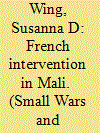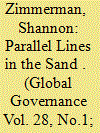| Srl | Item |
| 1 |
ID:
144330


|
|
|
|
|
| Summary/Abstract |
The March 2012 coup in Mali opened the door to expanded territorial occupation in northern Mali by Tuareg separatists and subsequently armed Islamist extremists. French forces intervened at the behest of the interim government in Mali. This article examines how various actors frame the conflict to their advantage. While the Malian government and France are allies, the position of various Tuareg actors shift over time as they strategize and weigh the value of allegiance with the French. Local extremist organizations are labeled as terrorists and are targeted as enemies. This article argues that the conflict has been decontextualized and framed within the ‘war on terror’. France’s decision to intervene and to expand their regional military presence, rather than exit, is legitimized by the framing of their intervention as integral to counterterrorism efforts.
|
|
|
|
|
|
|
|
|
|
|
|
|
|
|
|
| 2 |
ID:
171710


|
|
|
|
|
| Summary/Abstract |
President François Hollande entered public office in 2012 with a non-interventionist agenda that promised to draw down French troops in Africa and promoted collective African and European mechanisms to reduce France’s military footprint in the region. One year later, the same president deployed 4,000 combat troops to Mali, initially without any multilateral participation. To understand this apparent contradiction between multilateral rhetoric and operational unilateralism, this article looks at France’s efforts in previous years to establish African and European military operations in support of the Malian state. The article finds that France’s commitment to multilateralism is genuine yet not absolute – meaning that French policy-makers do not shy away from operational unilateralism if conditions on the ground seem to require swift and robust military action, as long as they can count on the political support of key international partners.
|
|
|
|
|
|
|
|
|
|
|
|
|
|
|
|
| 3 |
ID:
141151


|
|
|
|
|
| Summary/Abstract |
In 2013, France launched Operation ‘Serval’ to halt the southwards advance of Islamist insurgents in Mali. Using a Clausewitzian analytical framework, this article provides an assessment of France’s political and military aims in Mali and the degree to which they have been attained. Clear political goals, coordinated international diplomacy, an effective use of military force and blunders by the rebel forces turned ‘Serval’ into a short-term success. Strategically, however, the mission has proven unable to address the conflict’s underlying causes. Serval’s long-term effect is probably better measured by what it prevented than what it contributed.
|
|
|
|
|
|
|
|
|
|
|
|
|
|
|
|
| 4 |
ID:
184094


|
|
|
|
|
| Summary/Abstract |
UN peace operations are often accompanied by parallel forces from individual states, regional organizations, or “coalitions of the willing.” These forces remain distinct from the UN to address security concerns outside the remit of traditional peacekeeping. The deployment of UN stabilization operations, however, has resulted in an overlap between UN and parallel forces. This article investigates the complex relationships between UN stabilization operations and parallel forces using as examples the French and UN deployments in Mali and the Central African Republic. It concludes that when UN and parallel forces have distinct mandates, they often create military synergies but political tensions. In particular, when peacekeepers are reliant on parallel forces for military support, the UN can struggle to achieve its longer-term political tasks. When parallel forces are explicitly mandated to support UN efforts, the UN is better able to leverage its relationship with parallel forces to achieve its military and political objectives.
|
|
|
|
|
|
|
|
|
|
|
|
|
|
|
|